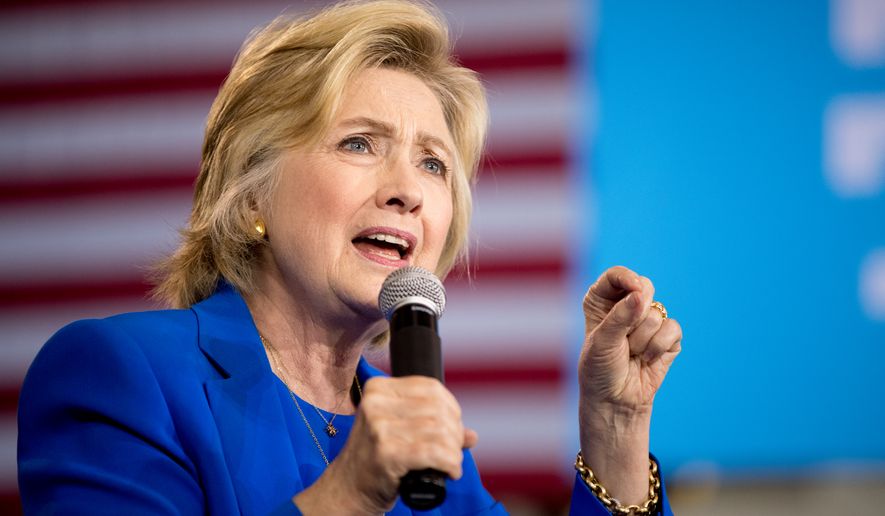Hillary Clinton made history not only as the first woman to capture a major party’s presidential nomination but also by having the most financial entanglements with foreign countries of anyone who has sought the White House.
Mrs. Clinton’s big-money ties to Russia, China, Algeria, Saudi Arabia and Oman, to name a few, are unprecedented for a U.S. presidential nominee, said George Washington University political historian Matthew Dallek.
“Obviously, this has caused some complications,” he said. “It is not helpful to her candidacy.”
He blamed Mrs. Clinton’s unique status as a former first lady and a confluence of trends, including the more interconnected global economy, increasingly robust post-presidential legacies and the rise of the presidential foundations modeled after the work of former President Carter.
“These forces have come together,” he said. “There will probably be more of these kinds of conflicts [for presidential candidates] going forward.”
The millions of dollars in foreign donations to the Clinton Foundation and enormous speaking fees that foreign entities paid former President Bill Clinton created potential conflicts of interest when Mrs. Clinton was secretary of state.
Those ethical quandaries could follow Mrs. Clinton to the Oval Office, said Hana Callaghan, director of government ethics at the Markkula Center for Applied Ethics at Santa Clara University in California.
“She has to convince the voters that she was not influenced by donations in the past, nor will she be influenced by donations in the future,” she said. “It’s up for the voters to decide whether that is going to affect her actions.”
According to Clinton Foundation disclosures, donations from foreign countries have included:
• Between $10 million and $25 million from the Kingdom of Saudi Arabia;
• Between $10 million and $25 million from the Commonwealth of Australia;
• Between $5 million and $10 million from the government of the Netherlands;
• Between $5 million and $10 million from the state of Kuwait;
• And between $500,000 and $1 million from the Foreign Affairs, Trade and Development Canada organization.
Mr. Clinton’s income from speeches to foreign entities spiked when his wife ran the State Department, including a $500,000 fee paid by a Russian investment bank with links to the Kremlin and a $550,000 fee paid by a Chinese business group for a speech in Shanghai.
Speaking fees of $500,000 or more also were paid by business interests in Austria, Hong Kong, Italy, Japan, Nigeria and United Arab Emirates. Before his wife ran the State Deponent, the typical speaking fee paid to Mr. Clinton was $150,000.
Mrs. Clinton’s emails from her time at the State Department have shown that some donors to the foundation asked for special treatment, although it was unclear whether they received it.
Countries and foreign businesses that either gave to the foundation or paid hefty speaking fees to Mr. Clinton did prosper during her tenure. In one case the U.S. signed off on a deal that gave Russia control of uranium mines stretching from Asia to the Western U.S., including half of America’s uranium supply.
Republican nominee Donald Trump has his own conflicts of interest that need to be addressed, including reports about large debts that his real estate empire owes to the Bank of China, said Ms. Callaghan.
Those concerns have been fanned by Mr. Trump’s refusal to release his tax returns, as is customary for presidential candidates. The New York billionaire said that his lawyers advised him against releasing tax returns because he is being audited by the Internal Revenue Service.
Mr. Trump also has business ventures around the globe, such as his golf resorts in Scotland and Dubai. He said his business empire will be turned over to his children if he becomes president.
“Neither candidate is being as transparent as they should be,” said Ms. Callahan.
The big question is what will Mrs. Clinton or Mr. Trump do once they move into the White House.
“Once elected, a public official has an ethical duty to avoid even the appearance of impropriety. If former President Clinton were taking speaking fees from foreign governments, that would be a clear conflict and certainly raises the specter of impropriety,” said Ms. Callaghan.
Mr. Clinton recently announced that he would stop giving paid speeches if his wife wins in November. The Clinton Foundation also announced that it would stop taking foreign donations if Mrs. Clinton become president.
But Mrs. Clinton said this week that her husband should not have to step down before the election from his position at the Clinton Foundation, as has been called for by Mr. Trump and others.
“I don’t think there are conflicts of interest,” she told ABC News. “I know that that’s what has been alleged and never proven. But nevertheless, I take it seriously.”
Mrs. Clinton said that she was “very proud” of the work done by the Clinton Foundation, which has included providing low-cost HIV/AIDS medication to developing countries.
“He started this great work. He has made it his life’s work, after the presidency. And he has said, if I am so fortunate enough to be elected, he will not be involved,” she said. “I think that is appropriate.”
• S.A. Miller can be reached at smiller@washingtontimes.com.




Please read our comment policy before commenting.